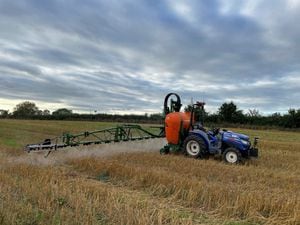'Too little, too late' fear over new environmental payments for Shropshire farmers
New payments for farmers of up to £1,000 a year to protect and boost nature risk being "too little, too late, say farmers leaders in Shropshire.

The increased rates will come under Environmental Land Management scheme (ELMs), which was designed to replace the EU's common agricultural policy (CAP)
But the announcement “risked being too little, too late” in a challenging economic climate, the Shropshire NFU said.
Speaking at the Oxford Farming Conference, Farming Minister Mark Spencer announced up to £1,000 extra cash for English farmers taking nature-friendly steps under the new “sustainable farming incentive” (SFI).
He said: "My challenge to our great industry is simple – this year, take another look at the Environmental Land Management schemes and think about what options and grants will help support your farm.
“As custodians of more than 70 per cent of our countryside, the nation is relying on its farmers to protect our landscapes as well as produce the high-quality food we are known for, and we are increasing payment rates to ensure farmers are not out of pocket for doing the right thing by the environment."
The increase in funding for environmental efforts is being paid for by ongoing annual reductions in basic payments being made to farmers, with more of the £2.4 billion annual agriculture budget now available for nature-friendly farming and schemes such as driving innovation on farms.
There will also be an average increase of 10 per cent in payment rates for farmers who are in Countryside Stewardship agreements for ongoing work such as maintaining bird-friendly seed margins, creating scrub habitat, and managing upland grass areas to provide habitat for bugs and ground-nesting birds.
And payments through one-off grants for activities such as creating hedgerows, rewetting peatland, and reducing farmyard runoff under the Countryside Stewardship scheme will also increase by an average of 48 per cent.
The announcement follows demands for clarity on the new Environmental Land Management scheme (ELMs) regime to pay farmers for “public goods” such as healthy soils, habitat creation and clean water.
Shropshire farmer Richard Yates, of Middleton Scriven, who represents county farmers on the NFU Council and as the union’s deputy regional board chairman, said clarity was needed on ELMs.
“We are planning well in advance for our businesses and in a position where we are having to making crucial long-term decisions," he said. "These are essential to running viable and profitable food producing businesses, without that clarity and it is needed.
“The latest changes are welcome, including enhanced payments for farmers and landowners through the Countryside Stewardship scheme and the introduction of a Sustainable Farming Incentive (SFI) management payment but it could be too little too late, especially given the current economic challenges we are all experiencing and the rapid erosion of direct payments.”
David Exwood, NFU vice president, added: “The NFU has always been very clear; for the ELM to succeed it needs to be simple, provide certainty and fairly reward farmers for taking part.
"British farmers are committed to delivering net zero agriculture by 2040, and the NFU remains committed to working with Defra to improve its ELM offer so the schemes can deliver the statutory environmental targets government ministers agreed last month. It is in everyone’s interest we ensure sustainable, climate-friendly British farming in the future, with farmers doing what they do best; producing food alongside protecting and maintaining our environment.”
Danny Brooks, agriculture area director for the West Midlands at Lloyds Bank, said the agriculture sector in the county can lead the way to achieving net zero.
"Agriculture plays a vital role in Shropshire’s economy, made up of growers and farms both large and small. Its influence is such that the sector is in a unique position to set an example for others to follow – particularly when it comes to working to achieve net zero," he said.
"The NFU has set the agriculture industry the ambitious target of hitting net zero by 2040 – ten years sooner than the national target set by the UK Government and no matter what stage farms are at on their journey towards net zero, support is on hand every step of the way."





